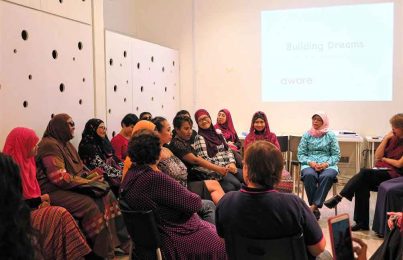
Women from all walks of life – mothers, scientists, and entrepreneurs – shared their insights, experiences and struggles on caregiving, leadership and employment at a dialogue session for Muslim women on Saturday, 25 March.
Together with partner organisation Daughters Of Tomorrow (DOT), AWARE conducted an intimate session with guest-of-honor Speaker of Parliament Halimah Yacob and 40 of DOT’s beneficiaries, mainly from low-income families. The event was run as part of International Women’s Day celebrations.
Many present were single mothers shouldering the heavy responsibilities of work, job-searching, childcare and eldercare. They courageously shared personal stories of financial struggles, divorce, family violence, and difficulties with employment, all while giving encouragement and advice for other women in similar situations.
Mdm Halimah started the session talking about her own difficult childhood and overcoming what seemed like impossible barriers – including her family’s financial struggles, and working from a young age to help her mother support the family, before pursuing her education further with a sense of determination and a strong work ethic. When asked about the difficulty of employment as a Muslim woman donning the tudung, Mdm Halimah and other speakers shared their own experiences confronting prejudice and grappling with being the object of curiosity, with some taking control of these uncomfortable instances by educating and starting open conversations.
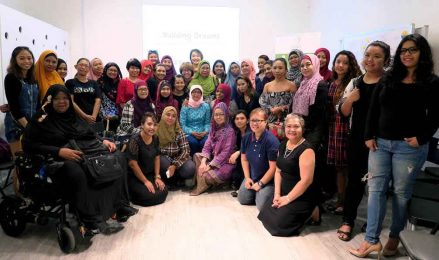
Nabila, a life coach, found herself $10,000 in debt when her ex-husband left her with a 3-month-old baby. She talked about how she cleared her debt, earned an MBA and eventually went on to speak at Harvard University, sharing the lessons she picked up along the way. Another guest speaker, Mdm Aisha, owner of Aisha’s Kitchen, is a divorcee who was left with four children and no employment prospects, but has now built a successful F&B business..
Common threads began to emerge as each woman shared her story: the importance of positive self-talk, finding strength in themselves and their children, and the huge challenges that come from balancing work and family.
It was a powerful and emotional afternoon for many of the women. At the end of the session, participants spoke of the renewed motivation and camaraderie they had with one another, upon having their stories heard and their perspectives affirmed.




 Last September, AWARE
Last September, AWARE 
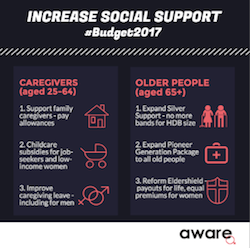 Gender equality group AWARE submitted its
Gender equality group AWARE submitted its 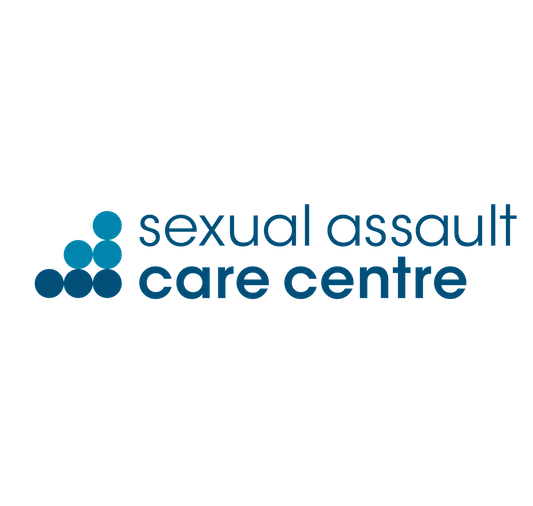 cent letters have expressed views on the use of judicial caning for sexual offenders –“Review age limit for caning sentences” (6 Jan) and “Relook need for corporal punishment” (9 Jan).Sexual violence of any form must be taken seriously. Clients of our Sexual Assault Care Centre (SACC), which supports women who have faced sexual assault including molest, have shared their experiences of the long term psychological and emotional impact of these experiences, including fear, anxiety, flashbacks and difficulties with relationships and intimacy.
cent letters have expressed views on the use of judicial caning for sexual offenders –“Review age limit for caning sentences” (6 Jan) and “Relook need for corporal punishment” (9 Jan).Sexual violence of any form must be taken seriously. Clients of our Sexual Assault Care Centre (SACC), which supports women who have faced sexual assault including molest, have shared their experiences of the long term psychological and emotional impact of these experiences, including fear, anxiety, flashbacks and difficulties with relationships and intimacy.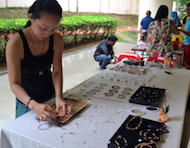 On 11 March, celebrate International Women’s Day with us at our FREE block party at the AWARE Centre. Browse through an eclectic flea-market (with handmade crafts, art, freshly baked goods and more), learn about other civil society groups in Singapore, chill out with live performances, pick up gems at the clothes and book swap, and try your luck in a raffle! Gather your friends and family, and come down for a celebratory day of community and solidarity.
On 11 March, celebrate International Women’s Day with us at our FREE block party at the AWARE Centre. Browse through an eclectic flea-market (with handmade crafts, art, freshly baked goods and more), learn about other civil society groups in Singapore, chill out with live performances, pick up gems at the clothes and book swap, and try your luck in a raffle! Gather your friends and family, and come down for a celebratory day of community and solidarity.